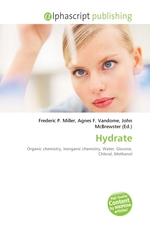Hydrate
Frederic P. Miller, Agnes F. Vandome, John McBrewster
бумажная книга
High Quality Content by WIKIPEDIA articles! Hydrate is a term used in inorganic chemistry and organic chemistry to indicate that a substance contains water. The chemical state of the water varies widely between hydrates, some of which were so labeled before their chemical structure was understood. In organic chemistry, hydrate is a compound formed by the addition of water or its elements to another molecule. For example, ethanol, CH3–CH2–OH, can be considered as a hydrate of ethene, CH2=CH2, formed by the addition of H to one C and OH to the other C. A molecule of water may be eliminated, for example by the action of sulfuric acid. Another example is chloral hydrate, CCl3–CH(OH)2, which can be formed by reaction of water with chloral, Ccl3–CH=O. Molecules have been labeled as hydrates for historical reasons. Glucose, C6H12O6, was originally thought of as C6(H2O)6 and described as a carbohydrate, but this is a very poor description of its structure as known today. And methanol is often sold as “methyl hydrate”, implying the incorrect formula CH3OH2, while the correct formula is CH3–OH.
Данное издание не является оригинальным. Книга печатается по технологии принт-он-деманд после получения заказа.


